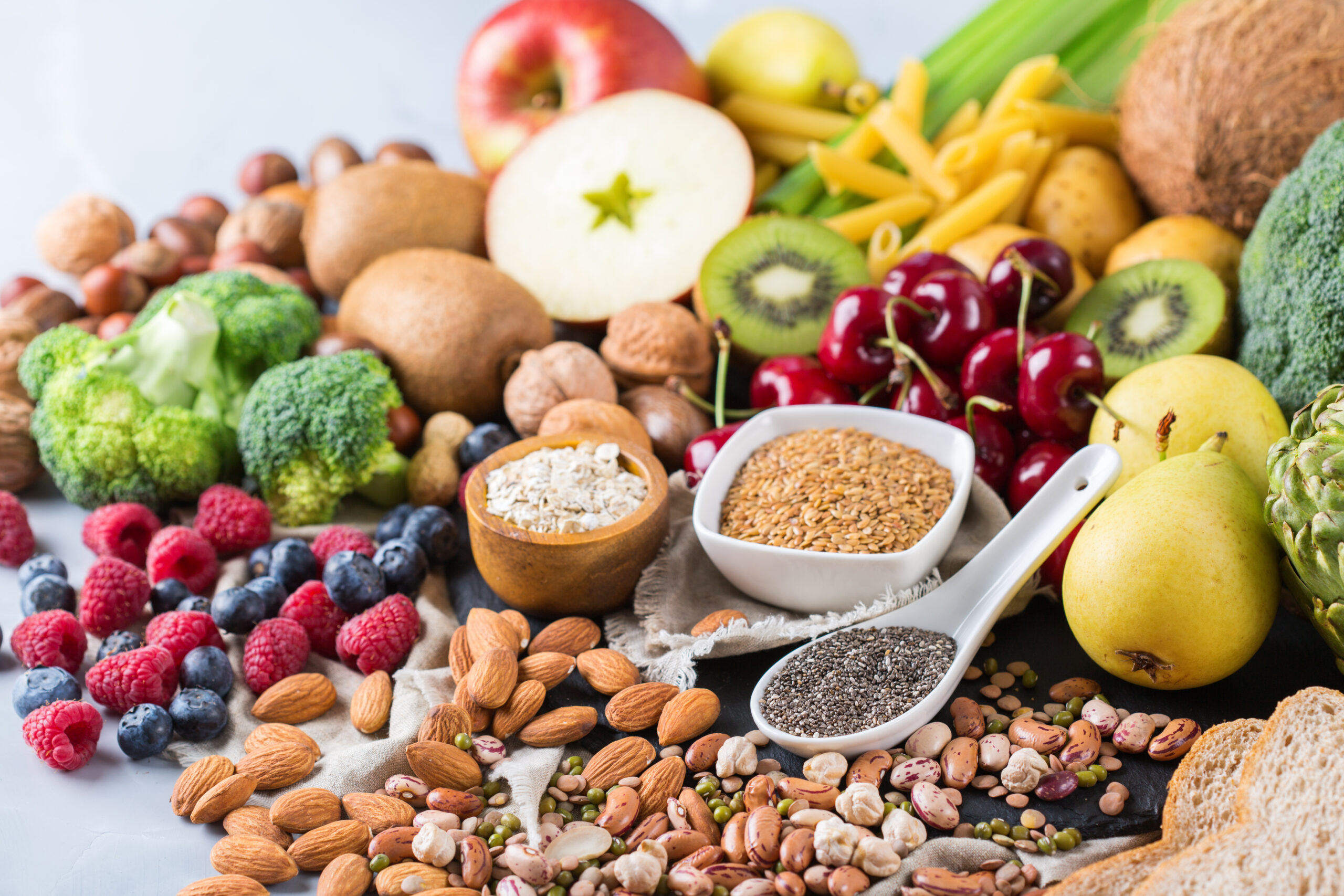पोषण और स्वास्थ्य की निरंतर विकसित होती दुनिया में, दो छोटे सुपरफूड्स— चिया सीड्स और अलसी के बीज —अपने प्रभावशाली स्वास्थ्य लाभों के लिए अत्यधिक लोकप्रिय हो गए हैं। दोनों ही बीज पोषक तत्वों से भरपूर, ओमेगा-3 फैटी एसिड, फाइबर और एंटीऑक्सीडेंट के पादप-आधारित स्रोत हैं। ये सदियों से प्राचीन आहार का हिस्सा रहे हैं और अब आधुनिक रसोई में भी मुख्य सामग्री हैं। लेकिन जब इन दोनों में से किसी एक को चुनने की बात आती है, तो सवाल उठता है: कौन सा बेहतर है—चिया सीड्स या अलसी के बीज?
पोषण संबंधी तुलना: चिया बीज बनाम अलसी के बीज
चिया और अलसी के बीज दोनों में ही शक्तिशाली पोषण होता है, लेकिन उनकी संरचना में थोड़ा अंतर होता है।
| पोषक तत्व (प्रति 28 ग्राम या 1 औंस) | चिया बीज | पटसन के बीज |
|---|---|---|
| कैलोरी | 137 | 150 |
| प्रोटीन | 4.4 ग्राम | 5.2 ग्राम |
| मोटा | 8.6 ग्राम | 12 ग्राम |
| ओमेगा-3 फैटी एसिड (ALA) | 4.9 ग्राम | 6.3 ग्राम |
| कार्बोहाइड्रेट | 12 ग्राम | 8 ग्राम |
| रेशा | 10.6 ग्राम | 7.8 ग्राम |
| कैल्शियम | 177मिग्रा | 71मिग्रा |
| लोहा | 1.6मिग्रा | 1.2मिग्रा |
| मैगनीशियम | 95मिग्रा | 110मिग्रा |
निर्णय:
- फाइबर और कैल्शियम के लिए चिया बीज फायदेमंद है।
- ओमेगा-3 और प्रोटीन के लिए अलसी के बीज सबसे आगे हैं।
दोनों ही आवश्यक पोषक तत्वों के उत्कृष्ट स्रोत हैं, लेकिन उनकी क्षमता आपके शरीर की आवश्यकता के आधार पर अलग-अलग होती है।
और पढ़ें:- चिया बीज के स्वास्थ्य लाभ
1. ओमेगा-3 फैटी एसिड: हृदय के लिए स्वस्थ विकल्प

चिया और अलसी के बीज, दोनों ही अल्फा-लिनोलेनिक एसिड (ALA) से भरपूर होते हैं, जो एक पादप-आधारित ओमेगा-3 फैटी एसिड है जो हृदय स्वास्थ्य के लिए अच्छा है और सूजन को कम करता है। हालाँकि, अलसी के बीजों में चिया के बीजों की तुलना में थोड़ा ज़्यादा ALA होता है।
- अलसी के बीज के लाभ: उच्च ALA सामग्री अलसी के बीज को हृदय स्वास्थ्य के लिए अधिक लाभकारी बनाती है, कोलेस्ट्रॉल कम करने में मदद करती है और हृदय संबंधी रोगों के जोखिम को कम करती है।
- चिया बीज के लाभ: यद्यपि ओमेगा-3 में थोड़ा कम, चिया बीज ओमेगा-3 और ओमेगा-6 फैटी एसिड का संतुलित अनुपात प्रदान करते हैं, जो समग्र चयापचय स्वास्थ्य को बढ़ावा देते हैं।
विजेता: अलसी के बीज (हृदय स्वास्थ्य के लिए थोड़ा बेहतर)।
2. फाइबर पावर: पाचन और चयापचय स्वास्थ्य

फाइबर पाचन स्वास्थ्य के लिए ज़रूरी है, और दोनों ही बीज इस मामले में बेहतरीन हैं। हालाँकि, चिया के बीजों में अलसी के बीजों से ज़्यादा आहारीय फाइबर होता है—लगभग 10 ग्राम प्रति औंस, जबकि अलसी में 8 ग्राम होता है।
चिया के बीज अपने वज़न से 12 गुना ज़्यादा पानी सोख लेते हैं , जिससे एक जेल जैसी स्थिरता बनती है जो पाचन में मदद करती है और आपको लंबे समय तक भरा हुआ महसूस कराती है। यही वजह है कि ये वज़न प्रबंधन और रक्त शर्करा नियंत्रण के लिए विशेष रूप से प्रभावी हैं ।
दूसरी ओर, अलसी के बीजों में घुलनशील और अघुलनशील दोनों प्रकार के फाइबर होते हैं, जो मल त्याग को नियंत्रित करने और पेट के स्वास्थ्य को बनाए रखने में मदद करते हैं।
विजेता: चिया बीज (उच्च फाइबर और हाइड्रेशन लाभ के लिए)।
3. प्रोटीन और वजन प्रबंधन

प्रोटीन मांसपेशियों की मरम्मत, ऊर्जा और समग्र विकास के लिए बेहद ज़रूरी है। अलसी के बीजों में थोड़ी बढ़त है, जिनमें प्रति औंस लगभग 5.2 ग्राम प्रोटीन होता है , जबकि चिया बीजों में 4.4 ग्राम प्रोटीन होता है ।
दोनों ही पादप-आधारित प्रोटीन स्रोत हैं जो शाकाहारियों और वीगन के लिए आदर्श हैं। क्विनोआ या फलियों जैसे अन्य पादप प्रोटीन के साथ मिलाने पर, ये एक संपूर्ण अमीनो एसिड प्रोफ़ाइल प्रदान करते हैं।
अपने उच्च फाइबर और प्रोटीन के कारण, दोनों बीज भूख को कम करने और तृप्ति को बढ़ावा देने में मदद करते हैं, जिससे अनावश्यक स्नैकिंग कम हो जाती है।
विजेता: अलसी के बीज (उच्च प्रोटीन सामग्री के लिए)।
4. एंटीऑक्सीडेंट और सूजन-रोधी लाभ
चिया और अलसी दोनों ही एंटीऑक्सीडेंट से भरपूर होते हैं जो शरीर को ऑक्सीडेटिव तनाव और कोशिकीय क्षति से बचाते हैं।
चिया के बीज क्वेरसेटिन और क्लोरोजेनिक एसिड जैसे पॉलीफेनोल्स से भरपूर होते हैं, जबकि अलसी के बीजों में लिग्नान होते हैं—जो मज़बूत एंटीऑक्सीडेंट और एस्ट्रोजेनिक गुणों वाले अनोखे यौगिक हैं। दरअसल, अलसी के बीज लिग्नान के सबसे समृद्ध ज्ञात स्रोतों में से एक हैं , जो स्तन कैंसर जैसे हार्मोन संबंधी कैंसर के जोखिम को कम करने में मदद कर सकते हैं।
विजेता: अलसी के बीज (उच्च लिग्नान और एंटीऑक्सीडेंट सामग्री के लिए)।
5. हड्डियों का स्वास्थ्य और सूक्ष्म पोषक तत्व

हड्डियों के स्वास्थ्य के लिए ज़रूरी खनिजों की बात करें तो चिया के बीज सबसे ज़्यादा फायदेमंद होते हैं। ये कैल्शियम, फॉस्फोरस और मैग्नीशियम से भरपूर होते हैं , जो हड्डियों की मज़बूती और घनत्व बनाए रखने में अहम भूमिका निभाते हैं।
अलसी के बीज मैग्नीशियम और फास्फोरस भी प्रदान करते हैं, लेकिन इनमें चिया बीजों की तुलना में कैल्शियम काफी कम होता है।
विजेता: चिया बीज (मजबूत हड्डियों के स्वास्थ्य के लिए)।
6. पाचन और जैवउपलब्धता
इन दोनों बीजों के बीच एक महत्वपूर्ण अंतर यह है कि इनका सेवन कैसे किया जाता है और शरीर इनके पोषक तत्वों को कितनी अच्छी तरह अवशोषित करता है ।
अलसी के बीजों का बाहरी आवरण कठोर होता है , जिससे शरीर के लिए इन्हें पूरी तरह पचाना मुश्किल हो जाता है। इनके पोषक तत्वों को पूरी तरह अवशोषित करने के लिए, इन्हें खाने से पहले पीसना ज़रूरी है । साबुत अलसी के बीज अक्सर पाचन तंत्र से बिना पचे ही निकल जाते हैं।
इसके विपरीत, चिया बीजों को पीसने की ज़रूरत नहीं होती । भिगोने पर, वे स्वाभाविक रूप से एक जेल बनाते हैं जो पचाने में आसान होता है और पोषक तत्वों के बेहतर अवशोषण में मदद करता है।
विजेता: चिया बीज (सुविधा और पाचनशक्ति के लिए)।
7. पाककला में उपयोग और बहुमुखी प्रतिभा
चिया और अलसी के बीज दोनों ही बहुमुखी हैं और इन्हें विभिन्न व्यंजनों में मिलाया जा सकता है, लेकिन इनकी बनावट और पाककला में भिन्नता है।
- चिया सीड्स का इस्तेमाल अक्सर पुडिंग, स्मूदी और ओवरनाइट ओट्स बनाने में किया जाता है क्योंकि ये फूलकर जेल जैसा बन जाते हैं। एक बड़ा चम्मच चिया सीड्स को तीन बड़े चम्मच पानी में मिलाकर बेकिंग में अंडे के विकल्प के रूप में भी इस्तेमाल किया जा सकता है।
- अलसी के बीज (खासकर पिसी हुई अलसी या अलसी का आटा) मफिन, पैनकेक और ब्रेड जैसे बेक्ड खाद्य पदार्थों में अच्छी तरह मिल जाते हैं। शाकाहारी व्यंजनों में भी इनका इस्तेमाल अंडे की जगह किया जा सकता है, बशर्ते अनुपात एक बड़ा चम्मच अलसी का आटा और तीन बड़े चम्मच पानी हो।
विजेता: टाई – चिया बीज हाइड्रेशन-आधारित व्यंजनों के लिए बेहतर हैं, जबकि अलसी के बीज बेकिंग और स्मूदी के लिए आदर्श हैं।
8. वजन घटाने के लाभ

दोनों बीज वज़न कम करने की चाह रखने वालों के बीच लोकप्रिय हैं। इनमें मौजूद फाइबर, प्रोटीन और स्वस्थ वसा का मिश्रण भूख कम करने और कैलोरी की मात्रा कम करने में मदद करता है।
चिया बीजों की जेल बनाने की क्षमता पाचन क्रिया को धीमा करती है, रक्त शर्करा के स्तर को स्थिर रखती है और ऊर्जा की कमी को रोकती है। वहीं, अलसी के बीज चयापचय में सुधार करते हैं और हार्मोन संतुलन बनाए रखते हैं, जो अप्रत्यक्ष रूप से वजन घटाने में सहायक हो सकता है।
विजेता: चिया बीज (भूख नियंत्रण के लिए थोड़ा बेहतर)।
9. संभावित कमियां
यद्यपि दोनों सुरक्षित और पौष्टिक हैं, लेकिन अधिक सेवन से मामूली दुष्प्रभाव हो सकते हैं:
- यदि चिया बीज को पर्याप्त पानी के बिना सूखा खाया जाए तो यह सूजन या बेचैनी पैदा कर सकता है।
- अलसी के बीजों में अल्प मात्रा में सायनोजेनिक ग्लाइकोसाइड्स होते हैं, जो अत्यधिक मात्रा में हानिकारक हो सकते हैं, हालांकि सामान्य सेवन पूरी तरह सुरक्षित है।
दोनों का सेवन हमेशा संयमित मात्रा में करें – अधिकांश वयस्कों के लिए प्रतिदिन लगभग 1-2 बड़े चम्मच पर्याप्त है।
अंतिम निर्णय: कौन बेहतर है?
चिया बीज और अलसी के बीज के बीच चुनाव आपके विशिष्ट स्वास्थ्य लक्ष्यों पर निर्भर करता है।
- अगर आप ज़्यादा फाइबर, कैल्शियम और आसान पाचन चाहते हैं तो चिया सीड्स चुनें । ये आंत के स्वास्थ्य, हड्डियों की मज़बूती और हाइड्रेशन में सुधार के लिए आदर्श हैं।
- अगर आप ज़्यादा ओमेगा-3, प्रोटीन और एंटीऑक्सीडेंट चाहते हैं तो अलसी के बीज चुनें । ये हृदय स्वास्थ्य, हार्मोन संतुलन और समग्र चयापचय के लिए बेहतर हैं।
संक्षेप में, चिया और अलसी के बीज दोनों ही पोषक तत्वों के भंडार हैं जो एक-दूसरे के पूरक हैं। सबसे अच्छा तरीका यह है कि किसी एक को दूसरे पर न तरजीह दी जाए, बल्कि पोषक तत्वों के संतुलित मिश्रण के लिए दोनों को अपने आहार में शामिल किया जाए । इन्हें स्मूदी, दही, ओटमील या बेक्ड चीज़ों पर छिड़कें—और इन छोटे बीजों के व्यापक स्वास्थ्य लाभों का आनंद लें।
और पढ़ें:- अलसी के बीज के फायदे
निष्कर्ष
चाहे आपको चिया सीड्स का जिलेटिन जैसा स्वाद पसंद हो या अलसी के बीजों का मेवे जैसा स्वाद, दोनों ही आपकी रसोई में जगह पाने के हकदार हैं। ये बीज साबित करते हैं कि अच्छी चीज़ें सचमुच छोटे पैकेज में आती हैं। इन्हें नियमित रूप से अपने भोजन में शामिल करके, आप हृदय स्वास्थ्य, पाचन, ऊर्जा और समग्र स्वास्थ्य को बेहतर बना सकते हैं।


